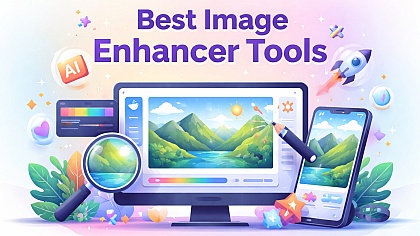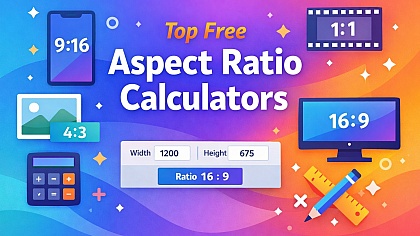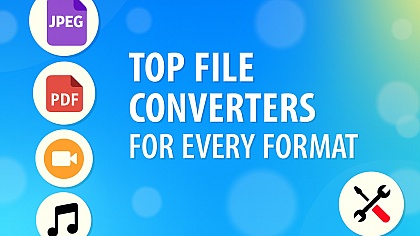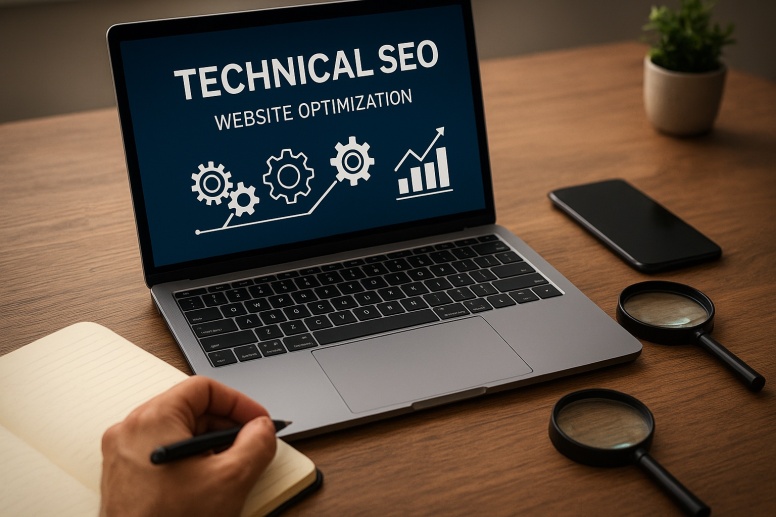
Technical SEO Consultant for Website Optimization
Your website looks brilliant, the content's spot-on, but somehow, you're still buried on page 47 of Google whilst competitors with uglier sites dominate page one. Sound familiar?
Here's the thing most people don't want to hear: beautiful websites that don't rank are just expensive digital brochures. The problem isn't usually your content or keywords - it's the technical foundation that search engines either love or completely ignore.
When businesses invest in SEO consulting services, they often focus entirely on content creation and keyword research, whilst completely overlooking the technical aspects that actually determine whether Google can find, crawl, and rank their pages effectively.
What Is Technical SEO? (Without the Jargon)
Technical SEO is essentially the behind-the-scenes optimization that ensures search engines can properly crawl, understand, and index your website. Think of it as the plumbing of your website - nobody sees it, but when it breaks, everything stops working.
The core elements of technical SEO addresses:
- Site crawlability - Can search engines find and access your pages?
- Page speed - Do your pages load fast enough to keep visitors engaged?
- Mobile optimization - Does your site work properly on smartphones and tablets?
- Site structure - Is your website organized in a logical, search-friendly way?
- Indexing - Are your important pages actually appearing in search results?
Why Technical SEO Matters More Than Ever
Google's algorithm updates have consistently prioritized user experience factors. The introduction of Core Web Vitals as ranking factors means that technical performance directly impacts your search visibility.
Key statistics that matter:
- 53% of mobile users abandon sites that take longer than 3 seconds to load
- Mobile searches account for over 60% of all Google searches
- Websites that pass Core Web Vitals assessments see an average 24% increase in search visibility
Common Technical SEO Problems That Kill Rankings
Site Speed Issues
Page speed isn't just about user experience - it's a direct ranking factor. Google gives websites roughly 3 seconds to load before users start abandoning them in droves.
What slows websites down:
- Oversized images - Photos that haven't been compressed or optimized
- Too many HTTP requests - Excessive external scripts and stylesheets
- Poor hosting - Cheap servers that can't handle traffic spikes
- Render-blocking resources - CSS and JavaScript that prevent content from loading
- No caching - Forcing browsers to reload everything on each visit
Crawl Errors and Accessibility Issues
Search engine crawlers need clear paths to discover and index your content. When technical barriers exist, even your best content remains invisible.
Common crawl problems:
- 404 errors - Broken links leading to non-existent pages
- Redirect chains - Multiple redirects that confuse crawlers
- Orphaned pages - Content with no internal links pointing to it
- Blocked resources - Important CSS or JavaScript files that crawlers can't access
- Incorrect robots.txt - Files that accidentally block important pages
Mobile Usability Disasters
With Google's mobile-first indexing, your mobile site performance determines your desktop rankings, too. Mobile usability problems directly impact search visibility.
Mobile technical issues:
- Unresponsive design - Content that doesn't adapt to different screen sizes
- Touch elements too close - Buttons and links that are impossible to tap accurately
- Text too small - Content requiring users to zoom in to read
- Horizontal scrolling - Pages wider than the mobile screen
- Slow mobile loading - Different (usually worse) performance on mobile devices
Duplicate Content and Canonicalization Problems
When multiple pages contain similar or identical content, search engines struggle to determine which version to rank, often resulting in none of them ranking well.
Duplicate content sources:
- URL variations - Same content accessible via multiple URLs
- Print versions - Separate printable pages with identical content
- Session IDs - Dynamic URLs that create infinite page variations
- Category and tag pages - Archive pages with overlapping content
- Product variations - E-commerce pages with minimal content differences
Core Technical SEO Elements to Optimize
XML Sitemaps
XML sitemaps act as a roadmap for search engines, helping them discover and understand your site structure. A properly configured sitemap includes your most important pages whilst excluding low-value or duplicate content.
Sitemap best practices:
- Include only indexable, high-quality pages
- Update automatically when new content is published
- Submit to Google Search Console and Bing Webmaster Tools
- Keep individual sitemaps under 50,000 URLs
- Use sitemap index files for larger sites
Schema Markup and Structured Data
Schema markup provides search engines with clearer context about your content, increasing the chances of earning rich snippets that boost click-through rates.
High-impact schema types:
- Article schema - For blog posts and news content
- Local business schema - For location-based businesses
- Product schema - For e-commerce pages
- FAQ schema - For frequently asked questions
- Review schema - For customer testimonials and ratings
SSL Certificates and HTTPS
HTTPS isn't just about security - it's a confirmed Google ranking factor. Sites without SSL certificates are flagged as "not secure" in browsers, damaging user trust and search performance.
HTTPS implementation checklist:
- Install a valid SSL certificate
- Update all internal links to HTTPS versions
- Set up 301 redirects from HTTP to HTTPS
- Update canonical tags and sitemaps
- Monitor for mixed content warnings
Core Web Vitals Optimization
Google's Core Web Vitals measure real-world user experience through three specific metrics that directly impact rankings.
The three Core Web Vitals:
- Largest Contentful Paint (LCP) - Measures loading performance (should be under 2.5 seconds)
- First Input Delay (FID) - Measures interactivity (should be under 100 milliseconds)
- Cumulative Layout Shift (CLS) - Measures visual stability (should be under 0.1)
Technical SEO Audit Process
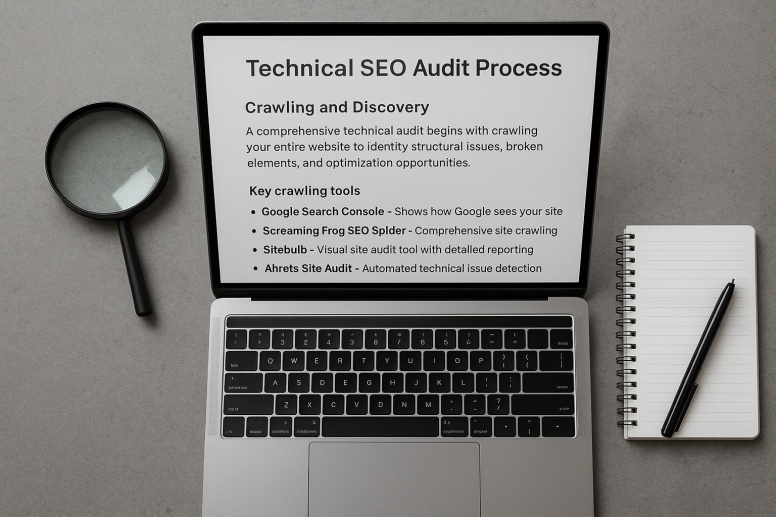
Crawling and Discovery
A comprehensive technical audit begins with crawling your entire website to identify structural issues, broken elements, and optimization opportunities.
Key crawling tools:
- Google Search Console - Shows how Google sees your site
- Screaming Frog SEO Spider - Comprehensive site crawling tool
- Sitebulb - Visual site audit tool with detailed reporting
- Ahrefs Site Audit - Automated technical issue detection
Performance Analysis
Page speed analysis reveals specific bottlenecks preventing optimal loading times across different devices and connection types.
Performance testing tools:
- Google PageSpeed Insights - Core Web Vitals assessment
- GTmetrix - Detailed performance breakdown
- WebPageTest - Advanced performance testing with global locations
- Lighthouse - Comprehensive site quality audit
Mobile Experience Evaluation
Mobile-first indexing means your mobile site performance determines your overall search visibility.
Mobile testing approaches:
- Google Mobile-Friendly Test - Basic mobile compatibility check
- Mobile usability reports in Search Console
- Real device testing across different screen sizes
- Mobile page speed analysis with cellular connection simulation
Advanced Technical SEO Strategies
International SEO Implementation
For websites targeting multiple countries or languages, proper technical implementation prevents content cannibalization and ensures correct geographic targeting.
International SEO elements:
- Hreflang tags - Signal language and regional targeting
- ccTLD vs subdirectory structure - Choose appropriate URL structure
- Geo-targeting settings - Configure Search Console for specific regions
- Currency and language consistency - Ensure coherent localization
JavaScript and Dynamic Content Optimization
Modern websites rely heavily on JavaScript, but search engines can struggle with dynamic content rendering.
JavaScript SEO considerations:
- Server-side rendering - Generate HTML on the server
- Static generation - Pre-build pages at deployment
- Progressive enhancement - Ensure content loads without JavaScript
- Critical rendering path optimization - Prioritize above-fold content
Large Site Architecture
Enterprise and large-scale websites require specific technical approaches to maintain crawl efficiency and user experience.
Large site technical strategies:
- Crawl budget optimization - Help search engines focus on important pages
- Internal linking hierarchy - Distribute authority effectively
- Pagination and infinite scroll - Implement search-friendly navigation
- Content delivery networks - Improve global loading speeds
Measuring Technical SEO Success
Key Performance Indicators
Technical SEO improvements should translate into measurable business outcomes, not just technical metrics.
Primary success metrics:
- Organic search visibility - Overall keyword ranking improvements
- Core Web Vitals scores - User experience metric improvements
- Crawl error reduction - Fewer technical barriers for search engines
- Page speed improvements - Faster loading times across devices
- Mobile usability scores - Better mobile user experience
Monitoring and Maintenance
Technical SEO isn't a one-time fix - it requires ongoing monitoring and maintenance to prevent issues from developing.
Ongoing monitoring tasks:
- Monthly crawl error checks - Identify new technical issues
- Performance monitoring - Track speed changes over time
- Search Console reviews - Monitor Google's site assessment
- Schema markup validation - Ensure structured data remains functional
Working with Technical SEO Consultants
When to Hire External Expertise
Technical SEO requires specialized knowledge that many in-house teams lack. Understanding when to seek external help can prevent costly mistakes and accelerate improvements.
Signs you need technical SEO consulting:
- Declining organic traffic despite quality content creation
- Poor Core Web Vitals scores are affecting user experience
- Complex technical issues beyond your team's expertise
- Website migrations or major structural changes
- International expansion requires technical implementation
What to Expect from Technical SEO Services
Professional consultants follow a structured approach to identify, prioritize, and resolve technical issues.
Standard technical SEO deliverables:
- Comprehensive site audit - Complete technical health assessment
- Prioritized action plan - Issues ranked by impact and difficulty
- Implementation guidance - Specific technical recommendations
- Progress monitoring - Ongoing tracking and reporting
- Developer collaboration - Technical specifications for implementation
Emerging technical SEO considerations:
- AI-generated content detection - How search engines evaluate automated content
- Voice search optimization - Technical requirements for voice query results
- Visual search capabilities - Image and video content technical optimization
- Core Web Vitals evolution - new user experience metrics and thresholds.

